
When we left off last time, Jesus had just predicted the fall of Jerusalem and the destruction of the Temple, which occurred about 30 years later in 70 AD. He’s not done telling the disciples about the future however, and continues his monologue in verses 10 through 28. Jesus mentions in passing that there will be world wars, natural disasters and supernatural judgments, but before that comes to pass they will each endure persecution at the hands of their countrymen. The disciples were to expect arrest, trials before governors and kings, imprisonment and worse all because they identified with Messiah.

Sometime after clearing the temple we find Jesus teaching in its courts and proclaiming the gospel. From this point forward events are going to happen quickly leading up to the climax. This encounter with the Pharisees of the temple is the first event that leads them down the path to a place where plotting Jesus’ demise is the only end. The religious authorities appear before Jesus to challenge him. They have not given their blessing to his teachings so they want to know, “By what authority are you doing these things?” Thinking they could trap him, Jesus proves more shrewd than they.
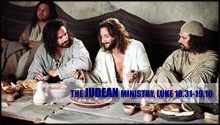
As one gets closer to death, it begins to become a natural part of conversation. I have a friend with cancer who is counting every day a blessing. I am grateful for her faithfulness and outlook on both the remainder of her days and her eternal destiny. Another friend, facing a different disease entirely, talks about being afraid of dying. Others, who aren’t suffering from anything besides old age, do the same; it’s a natural part of the human condition. So there is nothing morbid about Jesus telling his disciples about his eminent fate in Luke chapter 18.

Yesterday we learned of a teaching that dumbfounded the people of Jesus’ day, and today we come to one that will astonish modern readers. Just as Jesus challenged the assumed notions of the people of his day, so he continues to challenge the misconceptions of his modern children. Just like the disciples, there is always something we need to learn. While still in Samaria and on the way to Jerusalem, Jesus takes the disciples aside to teach them about their commitments toward others and God.

Immediately after toying with the Sadducees, while everyone was still listening to him, Jesus turned to his disciples and warned them against becoming hypocrites like the religious leaders. The Pharisees and their ilk may behave outwardly as devout men of God, but inwardly are devoted only to their own fame and fortune. It has been my experience that the more theatrical one is about their devotion, the darker the sins they are hiding. A good lesson for all church leaders to learn. An even better one is that such pretenders will be more severely punished.
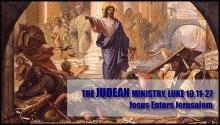
Jesus makes it to Jerusalem! After years of traveling around the country, teaching and performing miracles around Galilee, Samaria and then Judah to prove he is the savior and rightful king of all humanity, he comes to the nation’s capital to complete his mission. Of course, even as his ministry has aligned with prophecy so to must this significant event. As written in Zechariah 9.9: “Rejoice greatly, daughter of Zion! Shout, daughter of Jerusalem! Look! Your king is coming to you: he is legitimate and victorious, humble and riding on a donkey – on a young donkey, the foal of a female donkey.”
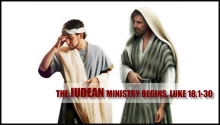
Growing up, my mother was fond of telling my sister and I, “When God tells us to do something it is very important. When he tells us to do something more than one it is very, very important.” At the beginning of chapter 18, Jesus tells another parable that teaches a truth he had revealed back in chapter 11 (you may want to revisit that teaching which may be found here: http://www.think-biblically.com/10-lucubrations/487-teach-us-to-pray). While it still seems inconsistent to me, Jesus tells us a second time to repeatedly go before God with our concern until he answers us.

We’ve all heard stories of people dying and coming back to life with stories of a darkness and a single point of light. Some of the stories we’ve heard of the afterlife have been confessed as just that, stories. Others have had experiences that have turned their life around. One friend of mine had just such an experience, and his seconds in what he firmly identifies as Hell was enough to drive him into the arms of our loving savior. Whatever you think of these accounts they are always of interest, for we all want to know what is on the other side.

Continuing his verbal assault on the religious leaders, Jesus asks a question about the Messiah. The question reveals something the religious leaders of the day never considered, and makes an obscure reference to near future they wouldn’t understand. What is this question? The Messiah is supposed to be a “Son of David”, but if so how is it that David calls him “Lord” (something a king would never do to a son)? The answer the religious leaders may have come up with, though it would have run contrary to their understanding of the nature of God, is that the Messiah is divine.
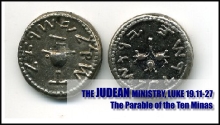
This is the finale of Jesus’ teaching regarding the coming Kingdom. Closing in on Jerusalem and the fulfilment of his mission the Messiah knew that many, including the 12, still misunderstood what the Kingdom is, how it will be ushered in, and whom will enter it. While teaching about attitude and responsibility over the last few parables, this one gives the disciples (and us) insight into the Kingdom of God and its people. To understand these nuances, we must first understand who the characters in this story represent.
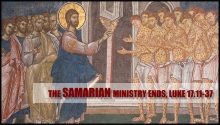
Today we find ourselves at a crossroads, the closing of the Samarian ministry and the beginning of the Judean. Jesus is approaching Jerusalem and his final battle. Somewhere in a region between Samaria and Galilee Jesus comes across 10 lepers, some of whom are Jewish and some Samaritan. Together they called out to the Messiah from a distance (lepers were not permitted to mix with healthy society), calling him “Master” and asked for mercy. Jesus did not approach the group, there was no laying on of hands, nor did he speak his now famous line, “your sins are forgiven.”

I have a confession to make: I strongly dislike this parable. I can’t say I hate it, per se, because it is part of God’s word and even the very words of our Lord. But I don’t like it because to the modern reader it is so easy to misunderstand. It’s not an illustration I would every use in teaching, and I wonder why Jesus did. I don’t think I’m alone, either as I rarely hear this passage preached on. Because it is part of God’s Word we are responsible for understanding it properly and – more importantly – doing what it says.

